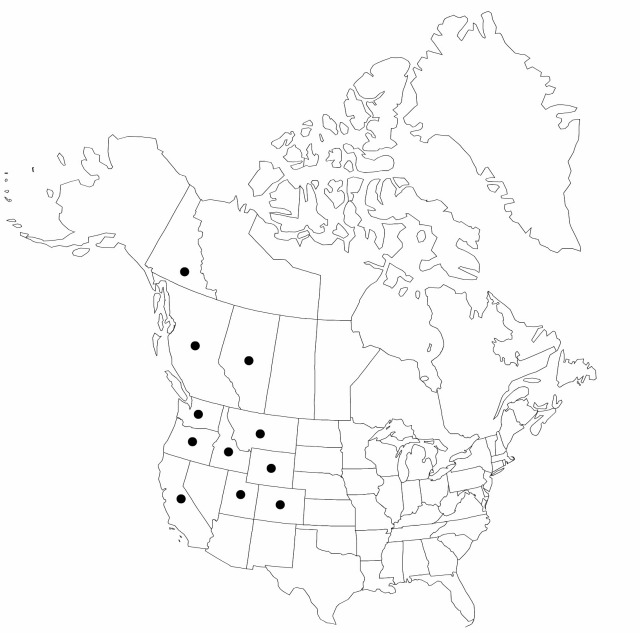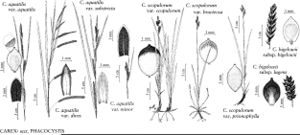Difference between revisions of "Carex scopulorum var. bracteosa"
Leafl. W. Bot. 9: 16. 1959.
Basionym: Carex vulgaris var. bracteosa L. H. Bailey Proc. Amer. Acad. Arts 22: 1887
Synonyms: Carex brachypoda T. Holm Carex campylocarpa T. Holm Carex campylocarpa subsp. affinis Maguire & A. H. Holmgren Carex gymnoclada unknown
FNA>Volume Importer |
FNA>Volume Importer |
||
| Line 7: | Line 7: | ||
|year=1959 | |year=1959 | ||
}} | }} | ||
| − | |basionyms={{Treatment/ID/ | + | |basionyms={{Treatment/ID/Basionym |
|name=Carex vulgaris var. bracteosa | |name=Carex vulgaris var. bracteosa | ||
|authority=L. H. Bailey | |authority=L. H. Bailey | ||
| + | |publication_title=Proc. Amer. Acad. Arts | ||
| + | |publication_place=22: 1887 | ||
}} | }} | ||
|synonyms={{Treatment/ID/Synonym | |synonyms={{Treatment/ID/Synonym | ||
| Line 38: | Line 40: | ||
|elevation=1200–3000 m | |elevation=1200–3000 m | ||
|distribution=Alta.;B.C.;Yukon;Calif.;Colo.;Idaho;Mont.;Oreg.;Utah;Wash.;Wyo. | |distribution=Alta.;B.C.;Yukon;Calif.;Colo.;Idaho;Mont.;Oreg.;Utah;Wash.;Wyo. | ||
| − | |discussion=<p>A common sedge of the central Rocky Mountains, <i>Carex scopulorum </i>var.<i> bracteosa</i> is distinguished from <i></i>var.<i> scopulorum</i> by the scabrous stems and sheaths and by the narrower, more ellipsoid perigynia. It is usually distinguishable from <i></i>var.<i> prionophylla</i> by the absence of bladeless, ladder-fibrillose sheaths; the two taxa may be difficult to identify in areas where both occur.</p> | + | |discussion=<p>A common sedge of the central Rocky Mountains, <i>Carex scopulorum </i>var.<i> bracteosa</i> is distinguished from <i></i></i>var.<i><i> scopulorum</i> by the scabrous stems and sheaths and by the narrower, more ellipsoid perigynia. It is usually distinguishable from <i></i></i>var.<i><i> prionophylla</i> by the absence of bladeless, ladder-fibrillose sheaths; the two taxa may be difficult to identify in areas where both occur.</p> |
|tables= | |tables= | ||
|references= | |references= | ||
| Line 62: | Line 64: | ||
|publication year=1959 | |publication year=1959 | ||
|special status= | |special status= | ||
| − | |source xml=https://jpend@bitbucket.org/aafc-mbb/fna-data-curation.git/src/ | + | |source xml=https://jpend@bitbucket.org/aafc-mbb/fna-data-curation.git/src/f6b125a955440c0872999024f038d74684f65921/coarse_grained_fna_xml/V23/V23_716.xml |
|genus=Carex | |genus=Carex | ||
|section=Carex sect. Phacocystis | |section=Carex sect. Phacocystis | ||
Revision as of 19:09, 24 September 2019
Culms 11–65 cm, scabrous on angles. Leaves: proximal sheaths red-brown, fronts with pale brown spots, veinless, with blades, glabrous, backs scabrous; blades 3–6 mm wide. Perigynia ellipsoid to obovoid, apex obtuse or rounded. 2n = 72–80.
Phenology: Fruiting Aug–Sep.
Habitat: Wet subalpine and alpine meadows
Elevation: 1200–3000 m
Distribution

Alta., B.C., Yukon, Calif., Colo., Idaho, Mont., Oreg., Utah, Wash., Wyo.
Discussion
A common sedge of the central Rocky Mountains, Carex scopulorum var. bracteosa is distinguished from var. scopulorum by the scabrous stems and sheaths and by the narrower, more ellipsoid perigynia. It is usually distinguishable from var. prionophylla by the absence of bladeless, ladder-fibrillose sheaths; the two taxa may be difficult to identify in areas where both occur.
Selected References
None.
Lower Taxa
None.
